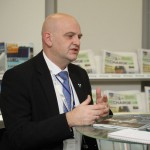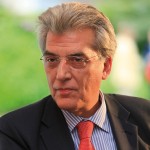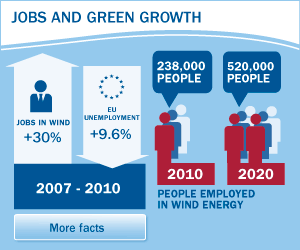 Although still in its infancy, the idea of a future offshore North Sea supergrid might benefit by experiencing regulated financing through national transmission tariffs as well as having a single planner, code, and regulator.
Although still in its infancy, the idea of a future offshore North Sea supergrid might benefit by experiencing regulated financing through national transmission tariffs as well as having a single planner, code, and regulator.
Those are some of the preliminary answers that the Friends of the Supergrid (FOSG) have raised to deal with important issues that still need to be addressed, people attending the Grids 2010 conference in Berlin were told today.
Ana Aguado, the Chief Executive Officer of FOSG, said during a conference session called “Planning a North Sea Supergrid” that the creation of such an entity also needs to have an efficient supply chain and an adequate number of properly trained workers.
 One of the biggest grids-related buzzes in the last couple of years has been the coming together of ten countries to promote an interconnected power network in the northern European seas. At the GRIDS 2010 event in Berlin I caught up with Jan Hensmans from Belgium’s Economy Ministry, who explained the ‘North Seas Countries Offshore Grid Initiative’ (NSCOGI) in more detail.
One of the biggest grids-related buzzes in the last couple of years has been the coming together of ten countries to promote an interconnected power network in the northern European seas. At the GRIDS 2010 event in Berlin I caught up with Jan Hensmans from Belgium’s Economy Ministry, who explained the ‘North Seas Countries Offshore Grid Initiative’ (NSCOGI) in more detail.
Why did Belgium decide to get involved in NSCOGI?
We saw the huge energy potential of the north seas and we had been involved in the ‘pentalateral energy forum’ with Germany, France, the Netherlands and Luxembourg, but five countries were not enough! So we set up a meeting with those and additional countries and the ministers signed a political statement on 7 December 2009. Then we organised a high level meeting in Ostend with EWEA – at which we agreed to sign a memorandum of understanding, which we will do on 3 December in Brussels.
 People attending the GRIDS 2010 conference may largely agree on the need for an extended European power grid, but there is far less consensus amongst the public and the issue must be addressed, said participants at a panel discussion this morning.
People attending the GRIDS 2010 conference may largely agree on the need for an extended European power grid, but there is far less consensus amongst the public and the issue must be addressed, said participants at a panel discussion this morning.
“Transmission system operators know exactly where the next grid lines are to go, but the permitting is a problem”, said Konstantin Staschus, Secretary General of the European Network of Transmission System Operators for Electricity (ENTSO-E).
“We need to explain to people that grid development is making life better for them, and not worse just because they see an electricity pylon on the horizon”, he said.
 Promoting wind power and other renewables while dramatically expanding the grid system are now cornerstones of German energy policy, people attending the opening session at the Grids 2010 conference in Berlin were told today.
Promoting wind power and other renewables while dramatically expanding the grid system are now cornerstones of German energy policy, people attending the opening session at the Grids 2010 conference in Berlin were told today.
Jochen Homann, State Secretary, Federal Ministry of Economics and Technology for Germany, also told conference delegates that Europe badly needs new electricity highways to efficiently meet future energy needs.
“The need to act is most pressing,” Homann said, adding European citizens need to understand why policy makers now agree that it is vitally important to update the grid system despite considerable associated challenges and costs.
 Delegates attending the Grids 2010 conference in Berlin on Tuesday and Wednesday will be hearing how both the future of Europe and its need for a totally revamped electricity structure are indelibly linked.
Delegates attending the Grids 2010 conference in Berlin on Tuesday and Wednesday will be hearing how both the future of Europe and its need for a totally revamped electricity structure are indelibly linked.
They’ll also hear that while building a so-called supergrid for the 21st century will be expensive, the many benefits will far outweigh any costs associated with such an ambitious European project. And, in any event, our existing outdated grid requires very substantial investment.
And they’ll learn that having a properly functioning electricity market will help drive Europe’s goal of realising a new and robust green economy that can mitigate climate change, create tens of thousands of well-paying jobs and drive down power prices.
 Although still in its infancy, the idea of a future offshore North Sea supergrid might benefit by experiencing regulated financing through national transmission tariffs as well as having a single planner, code, and regulator.
Although still in its infancy, the idea of a future offshore North Sea supergrid might benefit by experiencing regulated financing through national transmission tariffs as well as having a single planner, code, and regulator.






 Comments
Comments



